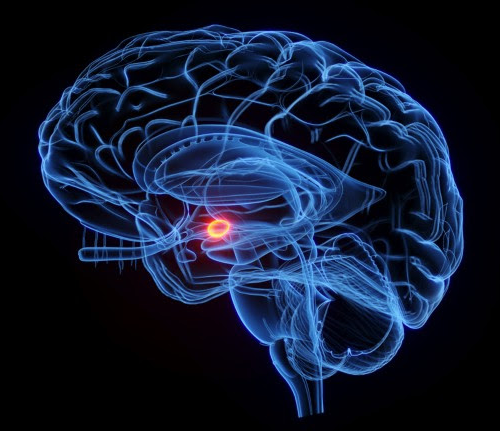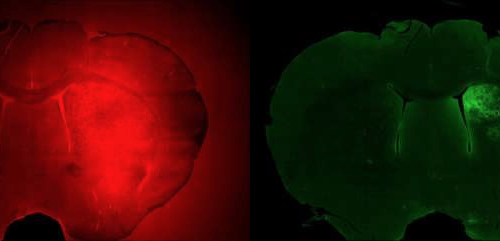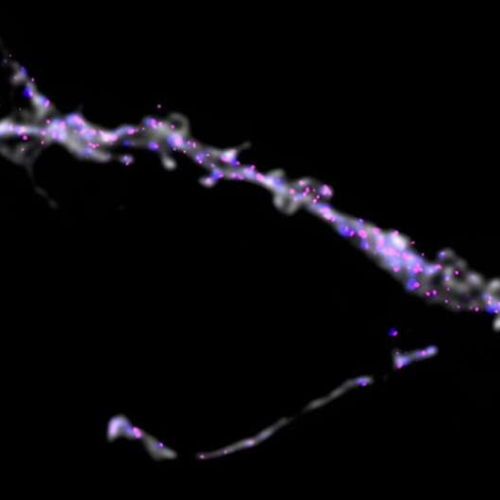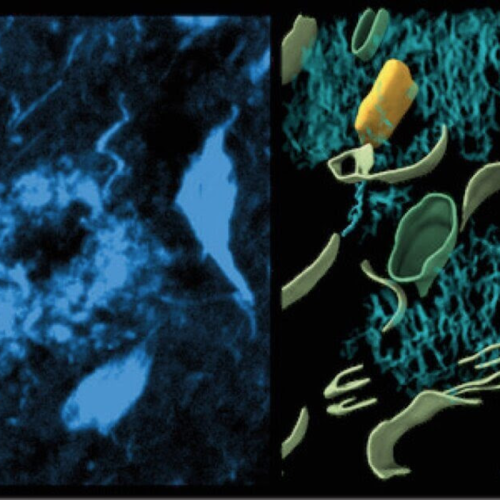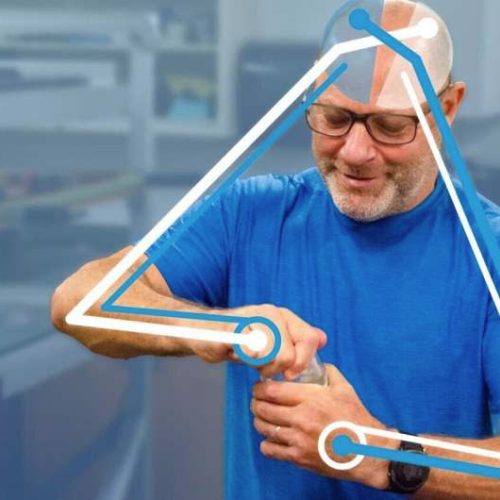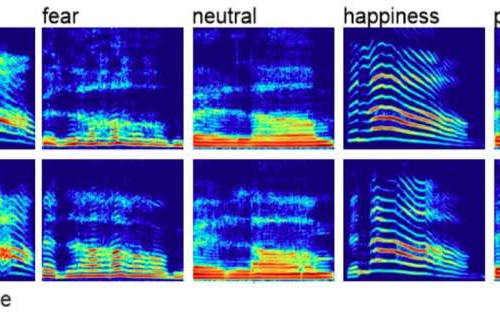08 August 2024 Stress leads to disarray of the gut microbiome, which in turn causes inflammation and a drop in the body’s ability to fend off infection. By Sara Reardon The vagus nerve connects the brain region called the amygdala (red; artist’s illustration) to nerves for the Brunner’s glands in the gut.Credit: Sebastian Kaulitzki/Science Photo...
Tag: <span>brain</span>
Researchers pioneer noninvasive measurement of gene expression at target locations in the brain
August 7, 2024 by Silvia Cernea Clark, Rice University Striatum region (left) in rodent brain with opened blood-brain barrier. Green fluorescent protein expressed in striatum region in rodent brain (right) in response to induced neuronal activity. Credit: Laboratory for Noninvasive Imaging/Rice UniversityThe ability to alter or prevent the expression of faulty genes in the brain...
Experimental drug shows promise in clearing HIV from brain
July 26, 2024 by Tulane University Phosphorylation activation of CSF1R is increased with simian immunodeficiency virus. Credit: Brain (2024). DOI: 10.1093/brain/awae153An experimental drug originally developed to treat cancer may help clear HIV from infected cells in the brain, according to a new Tulane University study. For the first time, researchers at Tulane National Primate Research...
Fruit may be the easiest way to shield your brain from depression as you age
HEALTH & WELLBEING By Bronwyn ThompsonJuly 23, 2024 Science suggests that three a day can benefit your mental wellbeing in later lifeDepositphotos If an apple a day keeps the doctor away, then a new study suggests upsizing this to a fruit salad may offer even more – by significantly lowering the risk of depressive symptoms...
Benzos Hard on the Brain, but Do They Raise Dementia Risk?
Medscape Medical News Benzos Hard on the Brain, but Do They Raise Dementia Risk?Megan Brooks July 01, 2024 New research supports current guidelines cautioning against long-term use of benzodiazepines. The study of more than 5000 older adults found that benzodiazepine use was associated with an accelerated reduction in the volume of the hippocampus and amygdala...
Molecular insights into cognitive impairment: New research uncovers how Parkinson’s affects the brain
JULY 11, 2024 by The Mount Sinai Hospital Image of a neuron that was part of the dataset. Credit: Mount Sinai Health SystemParkinson’s is associated with a higher risk of cognitive impairment and dementia that can severely impact quality of life. Cognitive symptoms include deficits in attention and mental flexibility, among others, and can pre-date...
Groundbreaking study reveals what Alzheimer’s disease looks like inside the brain
By Chris Melore Research led by Dr. Rene Frank, University of Leeds Jul 11, 2024 Left, fluorescence image of amyloid in cryo-preserved post-mortem human brain. Middle, 3-dimensional molecular architecture of β-amyloid plaque. Right, in-tissue structure of tau filaments within post-mortem brain. (CREDIT: University of Leeds) LEEDS, United Kingdom — In a world-first achievement, scientists are...
Alternative understanding of brain leads to new treatments for stroke patients
JULY 12, 2024 by Aaron Wagner, Pennsylvania State University The idea of complimentary dominance — both hemispheres of the brain contribute to different aspects of movement in both halves of the body — was developed by Professor Robert Sainburg, pictured here, who studied the hypothesis it for decades. Credit: Dennis Maney / Penn State. Creative...
An Air Pocket May Have Caused Electrode Threads to Retract From the Brain of First Human Neuralink Patient
Musk hopes to have thousands of humans implanted with Neuralink devices in the next few years. BY ANTHONY WOODUPDATED: JUL 12, 2024 11:35 AMPOSTED: JUL 12, 2024 11:29 AM Neuralink has revealed plans to change how it surgically implants brain-computer interfaces in human patients, after shifting air bubbles contributed to a number of electrode-bearing threads...
Our brains respond differently to human and AI-generated speech, but we still struggle to tell them apart
JUNE 24, 2024 by Federation of European Neuroscience Societies Spectrograms to demonstrate the similarity between human and AI voices. Credit: FENS Forum / Christine SkjegstadPeople are not very good at distinguishing between human voices and voices generated by artificial intelligence (AI), but our brains do respond differently to human and AI voices, according to research...

